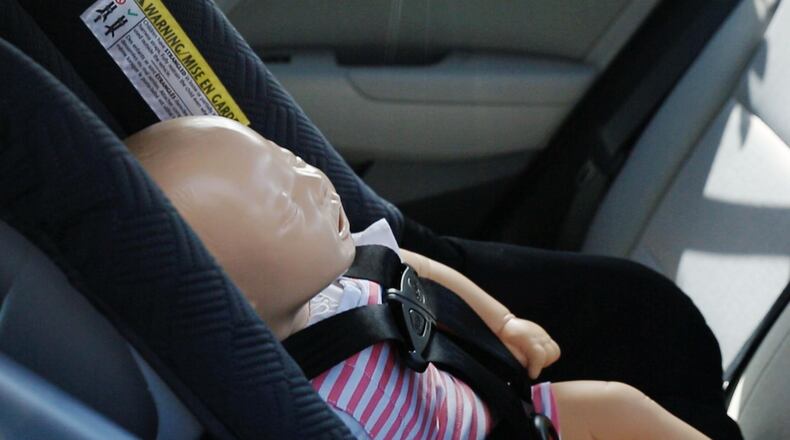MORE: ‘She was adorable’: Neighbor recalls Mason baby left in mom’s hot car
Last month in Mason, Karen Osorio-Martinez called 911 to report her 15-month-old daughter Sofia Averio dead in a car that had been in the work parking lot all day. The rear-facing car seat was located in the back of the vehicle behind the driver’s seat, according to the court records.
Osorio-Martinez, a Procter & Gamble scientist, told police she was running late to work on Aug. 23 and usually drops off her daughter at day care, a Mason detective said in a search warrant affidavit. The Warren County Prosecutor’s Office said the child’s death remains under investigation.
The proposal to require the alarms is included in a bill, the SELF-DRIVE Act, sponsored by Ohio Congressman Bob Latta, R-Bowling Green. The bill seeks to regulate the design, construction and performance of self-driving cars.
But while self-driving cars are still years down the road, the requirements for manufacturers to install rear occupant alert systems in virtually all passenger cars could come before 2020 if the bill becomes law this year. As currently written, the U.S. Transportation Secretary would be required to issue a final rule implementing the warning systems within two years of the bill becoming law.
MORE: Mason child left in vehicle for more than 10 hours
“There isn’t a Congressional district in the country that is immune from these tragedies,” said Ohio Congressman Tim Ryan, D-Niles, in a statement. In June, Ryan introduced the HOT CARS Act, from which the SELF-DRIVE Act’s language on rear passenger alert systems originated. “This legislation will help mobilize inexpensive, readily available rear seat technology to save children’s lives.”
Adding the alarms would be a “just in case” reminder for motorists, said Janette Fennell, president of KidsAndCars.org.
“The auto industry knows we are human and can unfortunately forget one step in this busy and fast-paced society,” Fennell said a statement. “They have kindly added reminders so we put on our seatbelts, to fill our low gas tank, leave our key in the ignition and turn off our headlights.”
Even without the regulation, automakers have already begun to introduce rear seat cameras said Michelle Krebs, senior analyst at Cox Automotive, which is owned by this newspaper’s parent company.
General Motors introduced a “Rear Seat Reminder” as a standard feature in the 2017 GMC Acadia, and has since expanded it to select Buick, Cadillac, Chevrolet and GMC models.
MORE: Mason mother was running late in child’s hot car death
GM’s system does not detect the presence of rear-seat passengers. Rather, it is activated when either rear door is opened and closed up to 10 minutes before the vehicle is started or while the vehicle is running, according to GM. The activated system then rings five chimes and displays a message in the driver’s electronic dashboard when the car is next turned off.
Nissan North America introduced a similar system this month in the 2018 Nissan Pathfinder SUV and will roll out the technology in other cars in coming years, according to the automaker.
While the HOT CARS Act was written so that cars “include a distinct auditory and visual alert that may be combined with a haptic alert,” or a vibration, the SELF-DRIVE Act does not specify the required type of warning system, according to copies of the bills.
Under the House’s language in the SELF-DRIVE Act, the requirement for a rear occupant alert system would be applicable to all new passenger vehicles weighing less than 10,000 pounds of gross vehicle weight. That measurement is the manufacturer’s maximum weight of a vehicle loaded with passengers and cargo, according to federal regulations.
MORE: New bill aims to stop hot car deaths
For reference, a 2015 GMC Yukon XL — one of the largest passenger SUVs on the market — weighs about 5,000-6,000 pounds without passengers and cargo, according to GM.
The regulation would not be without expense to car manufacturers, according to the Congressional Budget Office’s cost estimate. The nonpartisan office estimates manufacturers would need to install alarm systems in more than 10 million vehicles annually at a cost exceeding $100 million.
Other technology also exists to stem preventable child deaths in hot cars. Miamisburg-based Evenflo has created a car seat with an alert system that uses a sensor in the car seat buckle and chimes to remind drivers there is a child in the car seat.
Staff Writers Lawrence Budd, Rachel Murray and Jeremy Kelley contributed reporting.
About the Author
